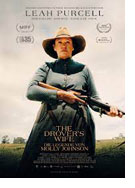

Opening 10 Nov 2022
Directed by:
Leah Purcell
Writing credits:
Leah Purcell
Principal actors:
Leah Purcell, Rob Collins, Sam Reid, Jessica De Gouw, Malachi Dower-Roberts
A tale as old as Methuselah and more patriarchal harkens to when women were fighting to stay alive, much less for rights, and in the decades since are still grasping. Australian stage-screen actress Leah Purcell reworks Australia’s “greatest short story writer” Henry Lawson’s 1892 eponymous story. Initial nurturing by the virtuoso writer-director-star yielded The Drover’s Wife: The Legend of Molly Johnson, an award-winning play. In 2019 she developed that into a book, which was a springboard for the impressive cinematic version. Combining Indigenous feminine intuition and experience with folkloric stories passed down by Goa–Gunggari–Wakka Wakka Murri ancestors—her grandfather inspired the Yadaka character—infuses wondrousness into this revisionist film’s authenticity.
1893, Snowy Mountains, Australia, outback. Molly Johnson (Leah Purcell) is bulgingly pregnant when a wagon with the Crown’s newly appointed district Sergeant Nate Klintoff (Sam Reid) and London born missus Louisa (Jessica De Gouw) creaks into her life. Attracted off course by the mouthwatering scent of beef roasting, they share and exchange kindnesses; Molly gives victuals while the Klintoffs give the four Johnson young’uns a ride to the Everton settlement where they are expected. Danny (Malachi Dower-Roberts), the eldest, will return to help when she delivers, after some bartering and purchasing supplies. During his absence, Molly has back-to-back surprises: a prone shackled man in the yard and going into labor. The dark man’s sketchy history she relates to, and is on guard, wary. Yadaka’s (Rob Collins) actions and words are intuitively heedful; gradually an unlikely, trustful, and mannerly friendship blossoms. Danny shows an openness toward the stranger; amity grows between them. Concurrently, in town Miss Shirley’s spiffed Molly’s young’uns, Louisa’s initial newssheet topic—battered women—has men snorting derisively; the Drover’s horse appears riderless; Judge Eisenmangher’s (Nicholas Hope) shrewdly observant, wherefore Sergeant Klintoff sets in motion ill-considered plans.
Filming on location in New South Wales, Australia, cinematographer Mark Wareham captures the majestic magnitude, breath, and scope of the rugged, isolated landscape, Dany Cooper deftly edits, and Salliana Seven Campbell composed and performs evocative original music. As well as folkloric stories, Purcell scoured historical accounts of Australian males’ rugged, i.e., capacity for violence, dominator force and sexual degradation against women, and in particular the Māori society. It was not until the mid-1800s that a gradual shift toward prudent civilization began. (Marinell Haegelin)